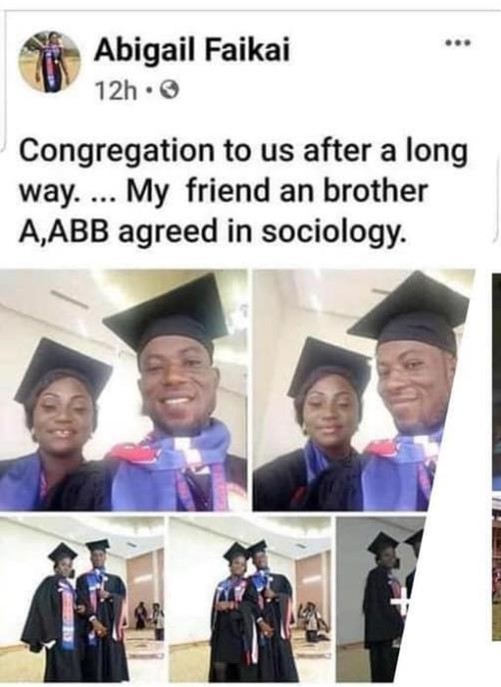Last week, one of the biggest gossips among Liberians on social media was the story of Abigail Faikai and her not so skillful use of the English language.
On her personal Facebook page, Faikai celebrated her graduation from the University of Liberia with a post: “Congregation to us after a long way… My friend an brother A,ABB agreed in sociology.” Accompanying the post were pictures of Faikai and a man in graduation gowns.

Photo: Facebook/Abigail Faikai
Given that the University of Liberia’s graduation ceremonies lasted longer than a week, all of Monrovia was focused on the school and its graduates. It was no surprise then that Faikai’s post garnered significant attention.
Almost all the so-called blogs shared posts commenting on Faikai’s creative use of the English language. Ordinary people joined in, as many ridiculed Faikai for her errors. Some even called for the University of Liberia to revoke the degree it had granted to her. Many seemed unaware of the irony in their actions, as their own posts that were critical of Faikai also had grammatical and spelling errors.
Worst was the fact that many commenters simply believed Faikai to be an anomaly – as if we lived in an alternate universe where the University of Liberia was a prestigious place of learning that we all expected to produce high-quality products. This is not a problem that only the University of Liberia faces – in fact, no tertiary education institution in the entire country has established a formula that consistently produces high-quality graduates who are prepared to enter the workforce.
Liberian college grads finish school without knowing how to conduct meaningful research using the internet or how to use Microsoft Excel. Most are unaware of the vast sections of the internet that exists outside of social media.
Liberian college grads complete their education without developing a professional work ethic such as respect for punctuality, integrity, and knowledge of effective professional communications.
Liberian college grads are so used to a copy-and-paste method of problem-solving that they would not be able to use critical thinking to solve a problem they’ve never encountered before.
It’s not a surprise, though. Their schools often cut corners, with many hiring substandard part-time professors who dedicate little time to students outside of the classroom – that is, if they don’t cancel classes without explanation. These institutions don’t have career centers whose job is to help students find jobs, train them on how to interview and interact with potential employers, and provide assistance to ensure that graduates are properly equipped to function in the workplace.
A 2017 World Bank report on tertiary education in Liberia summarized the problem: “Standards throughout the sector are low, and there are reports of academic malpractice and corruption. There is no quality control in the system, leading to low accountability of teaching staff.”
Liberian universities only care about collecting tuition and fees from students. Their actions have shown that they don’t care about the future of the Liberian youth.
It’s no wonder, then, that the vast majority of the tens of thousands of graduates coming out every year will not find a job – the main reason most students attend the university in the first place.
It’s not that there aren’t companies in Liberia willing to hire qualified Liberians – it’s more that the graduates coming out of the universities simply don’t have the necessary skills to do the work. Universities have not demonstrated their relevance to Liberia’s economy, and they have not shown that they offer value for money. Yet, private institutions are charging between US$3,000-10,000 for four years of questionable education.
Even then, our leaders turn a blind eye to improving quality in tertiary education. When lawmakers are not building their private institutions with funds siphoned from government coffers, they’re advocating for community colleges to be elevated to bachelor’s degree-granting institutions when those colleges already struggle to retain and pay quality staff.
Moreover, the National Commission on Higher Education seems to grant accreditation to any college that applies and pays the fees. According to the World Bank report on tertiary institutions, the procedures required for an institution to become licensed is “minimal” and it is not “accompanied by any subsequent accreditation or quality assurance procedures.”
The report further notes that there simply isn’t any independent quality assurance agency to evaluate Liberia’s universities. It’s no wonder, then, that of the 47 tertiary learning institutions accredited by the NCHE by September 2020, none would be seen as a hallmark of excellence.
And yet, we’re here shaming Faikai instead of asking why the University of Liberia and all of Liberia’s universities would even accept and grant degrees to students who cannot properly compose a sentence. We may laugh at Faikai, but it’s all too apparent that the system has failed us too.
Featured photo by Ida Reeves



